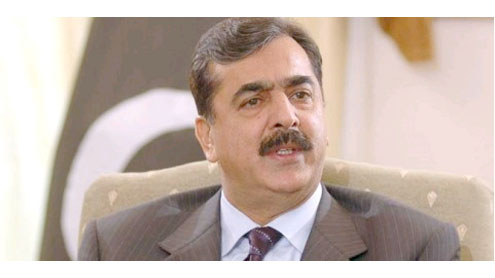 Prime Minister Yousaf Raza Gilani is rather unpredictable. One minute he is breathing fire and the next minute he melts like candle wax.
Prime Minister Yousaf Raza Gilani is rather unpredictable. One minute he is breathing fire and the next minute he melts like candle wax.
The prime minister gave an interview to China’s People’s Daily Online in which he said the affidavits submitted by the Chief of Army Staff (COAS) General Kayani and DG ISI General Pasha were “unconstitutional and illegal”. On Wednesday, Mr Gilani retracted his statement: “I want to dispel the impression that the military leadership acted unconstitutionally or violated rules…The remarks were made in a different context…The current situation cannot afford conflict among the institutions.”
What is the message that Prime Minister Gilani is trying to give us here? Just because, in the words of the premier, “there were a lot of events taking place and there was overlapping by lot of government functionaries on many issues, and I said it in that context”, are we to believe that everything is now hunky-dory and the generals were not crossing their limits? If so, why create this confusion in the first place? The Pakistan People’s Party (PPP) government has survived for four years despite many hurdles but it has also created confusion as far as civil-military relations are concerned.
There is no denying that the military is the most powerful institution in the country but the way this government has dealt with it is not becoming of a democratically elected government.The PPP-led government tried to appease the military from day one but that has not helped it at all. Even giving extensions to the army chief and DG ISI has not worked. The government’s flip-flopping has not worked either. From the first day, the government should have made it clear to the military that the past is the past and history is history. Demarcation of policy purview must now be done as is the right of an elected civilian government.
The army is subservient to the government under the constitution. Granted that this has not been the case practically but theoretically it is quite clear who should be the boss, i.e. the executive. Instead, the PPP went about addressing the civil-military relations in a naïve way. In an interview in 2008 with the Wall Street Journal, President Zardari said the militant groups operating in Indian-held Kashmir (IHK) were terrorists. This worked like a red rag to the army’s bull because the Kashmir issue is the raison d’être of our military’s national security paradigm. Another statement by the president with regard to a ‘no first use’ nuclear policy while talking to the Indian press landed the government in hot water.
According to WikiLeaks, General Kayani did not support this statement. Nuclear weapons in the Indian subcontinent are deterrents but both India and Pakistan need to engage with each other on the nuclear threat in order to explore this issue further. Changing the status quo to obviate the nuclear threat hovering over our heads would be a welcome move indeed but for that a joint mechanism needs to be adopted.Such statements by the president and in recent months by the prime minister are examples of the government’s adventurism. Retracting these statements or taking a u-turn on earlier stands is a form of appeasement. The civil-military imbalance is a fact of life in Pakistan. The only way to change the current status quo is through intelligent and consistent means instead of flip-flopping every now and then. – Dailytimes












